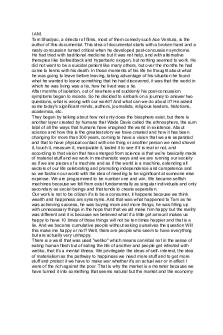Beverly Tatum, \"Who Am I\" Group Discussion PDF

| Title | Beverly Tatum, \"Who Am I\" Group Discussion |
|---|---|
| Author | Kristen Satkowiak |
| Course | CGL 145 |
| Institution | Central Michigan University |
| Pages | 2 |
| File Size | 33.8 KB |
| File Type | |
| Total Downloads | 94 |
| Total Views | 156 |
Summary
Article summary. You have to be discussion leader for three different articles and this is one of the long articles....
Description
Kristen Satkowiak CGL 145 Beverly Tatum, “Who Am I?” Group Discussion In America, the mythical norm is “white, thin, male, young, heterosexual, Christian, and financially secure.” This is a perfect example of a stereotypical, unattainable, dominant group that is covered in this article and if you are not all of these things, you must fall into at least one subordinate grouping. It is easy to learn everything about the average dominant American life through television and social media. Whether the dominant groups just don’t know or don’t care to learn, they are essentially clueless about subordinates’ lives and experiences, yet still determine the parameters and hold the power to categorize people into dominant or subordinate groupings. These groupings are based on race or ethnicity, gender, religion, sexual orientation, socioeconomic status, age, and physical or mental ability Subordinates listen and follow because people pay attention to people who have control over the outcomes of their lives. In response, subordinate groups can take this in one of two ways: attending closely to the dominant groups, or pushing societal limits and testing their luck, both having downsides. By causing no trouble they are eliminating time and energy towards self-care and may be taking in harsh or offensive messages, yet pushing barriers can mean many other, deeper consequences socially or even with the law. Through history there has always been and continues to be a divide between the two groups. We should each have a moral obligation to learn and respect what makes every person unique instead of shunning them for what they cannot control. It may be hard for everyone to see, but it is articles like this that open our eyes to the way the world could be if there was no divide.
Kristen Satkowiak CGL 145
1. What dominate groups and what subordinate groups do you each fall into and how has this affected you up to this point in your life? 2. In the middle of the article it states that “inequitable (unjust) social relations are seen as the model for “normal human relationships.”” Should this be the model of human relationships? How can this change? 3. In the last sentence of the article is says “embracing all of our identities creates the possibility of building alliances that may ultimately free us all.” How could the world be if there was no divide?...
Similar Free PDFs
![[Template] Who am I](https://pdfedu.com/img/crop/172x258/6n3e9lyvq625.jpg)
[Template] Who am I
- 2 Pages

Ensayo I AM SAM
- 3 Pages

Group Panel Discussion Outline
- 8 Pages

Aje Group Discussion 3
- 2 Pages

Group discussion 1- Marriott
- 2 Pages

PLS Discussion Group 1
- 2 Pages

Beverly Gardens Park 2010
- 22 Pages

I am a rock - Poem
- 1 Pages

I AM SAM Movie Reflection
- 2 Pages
Popular Institutions
- Tinajero National High School - Annex
- Politeknik Caltex Riau
- Yokohama City University
- SGT University
- University of Al-Qadisiyah
- Divine Word College of Vigan
- Techniek College Rotterdam
- Universidade de Santiago
- Universiti Teknologi MARA Cawangan Johor Kampus Pasir Gudang
- Poltekkes Kemenkes Yogyakarta
- Baguio City National High School
- Colegio san marcos
- preparatoria uno
- Centro de Bachillerato Tecnológico Industrial y de Servicios No. 107
- Dalian Maritime University
- Quang Trung Secondary School
- Colegio Tecnológico en Informática
- Corporación Regional de Educación Superior
- Grupo CEDVA
- Dar Al Uloom University
- Centro de Estudios Preuniversitarios de la Universidad Nacional de Ingeniería
- 上智大学
- Aakash International School, Nuna Majara
- San Felipe Neri Catholic School
- Kang Chiao International School - New Taipei City
- Misamis Occidental National High School
- Institución Educativa Escuela Normal Juan Ladrilleros
- Kolehiyo ng Pantukan
- Batanes State College
- Instituto Continental
- Sekolah Menengah Kejuruan Kesehatan Kaltara (Tarakan)
- Colegio de La Inmaculada Concepcion - Cebu






